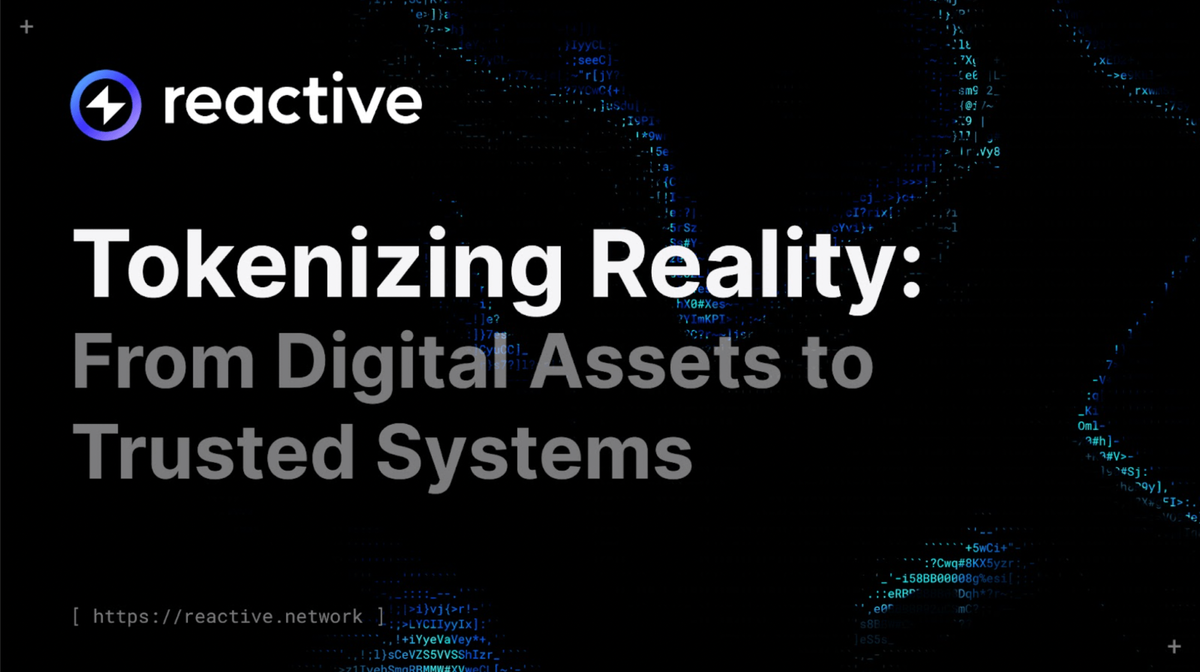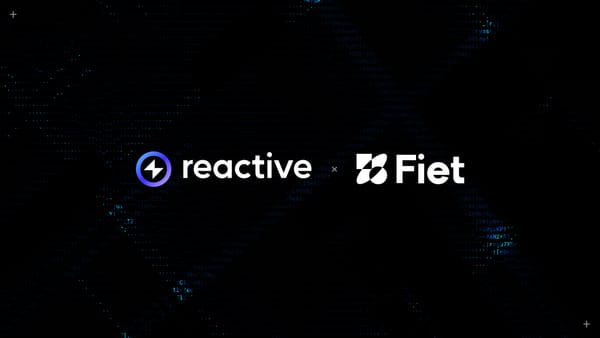Tokenizing Reality: From Digital Assets to Trusted Systems

The tokenization of real-world assets (RWAs) has gained significant momentum, but its long-term success depends on what comes after issuance — the creation of trust infrastructure that makes trading on secondary markets viable. As more participants enter the market, both buyers and sellers need confidence that the digital tokens they exchange accurately reflect the real-world assets behind them.
This article elaborates on how validators, escrow services, and dispute resolution mechanisms help establish that confidence in decentralized RWA environments. It also looks at how reactive contracts can support programmable workflows that align on-chain actions with off-chain realities.
Trust Gap in RWA Secondary Markets
Blockchains are exceptionally good at transferring ownership and recording transactions in a transparent, immutable way. However, they fall short when it comes to verifying off-chain truths — such as whether a property is in the condition advertised, a commodity is authentic, or a contractual obligation has been properly fulfilled. This limitation creates a trust gap that becomes especially problematic in secondary markets, where tokenized assets change hands between parties with no prior relationship or assurance of mutual trust.
Without mechanisms to mitigate these risks, secondary RWA markets will struggle to gain mainstream trust and adoption regardless of blockchain efficiency.
Validators & Escrow Services
Validators serve as trusted experts who assess and confirm the authenticity, quality, and condition of tokenized RWAs. Their attestations bridge on-chain digital representation with real-world facts.
Roles and benefits of validators:
- Provide inspection reports, certifications, or appraisals linked to asset tokens.
- Reduce risk by mitigating fraud and misrepresentation.
- Enable reputation-based systems that incentivize accuracy and trustworthiness.
- Facilitate regulatory compliance by producing verifiable audit trails.
As validator networks mature, reputation systems will play a critical role in signaling reliability and domain expertise, helping buyers select credible validators.
Escrow acts as a neutral intermediary holding funds during a transaction until all conditions are satisfied. This service is crucial in RWAs, where:
- Asset delivery or transfer might be contingent on inspection outcomes.
- Payment must be conditional on validator confirmation or dispute resolution.
- Parties require protection against counterparty default or misbehavior.
Decentralized escrow mechanisms integrated with smart contracts can automate fund release, reducing reliance on centralized intermediaries and increasing transparency.
? Note: Dispute ResolutionEven with validators and escrow in place, disagreements may arise over asset condition, delivery timelines, or contractual fulfillment. On-chain dispute resolution frameworks are essential for addressing these conflicts. These systems provide structured claim submission, evidence evaluation, and neutral adjudication (via arbitrators or DAO-based systems), and ensure that outcomes are enforceable. Integrating this functionality directly into smart contract workflows increases trust, lowers legal friction, and helps secondary markets operate with greater reliability.
Historical data from crypto markets underscores the risks of insufficient verification. A 2021 academic study analyzing Uniswap activity found that over 10,000 scam tokens had been deployed — accounting for nearly 50% of all listings — with scammers profiting at least $16 million in aggregate losses to users (“Trade or Trick?”, Arizona State University). This pattern has not abated: in 2025, a report from Forta revealed that nearly 90% of tokens launched with Uniswap v2 pools on the Base network were classified as “hard rug pulls” during a 28-day window (Forta). These findings highlight the ongoing prevalence of fraudulent activity in decentralized environments — and without reliable trust layers, tokenized real-world assets face comparable, if not greater, risks due to the financial and legal weight of their off-chain backing.
Reactive Contracts for RWA Markets
Traditional smart contracts operate based on predefined logic that is triggered by on-chain transactions. However, real-world asset (RWA) markets involve processes that are influenced by external factors — such as validator attestations, property inspection results, escrow updates, and the outcomes of disputes — which originate outside the blockchain.
Reactive contracts, like those developed on the Reactive Network, are designed to accommodate these needs. They monitor external data sources and execute logic when specific off-chain conditions are met. Unlike traditional oracles, which simply deliver data to smart contracts, reactive contracts are inherently event-driven — they treat off-chain conditions as triggers that directly initiate on-chain logic. This approach allows contracts to respond flexibly to real-world events without requiring direct user input.
The benefits of this model are significant. Third-party validation data can be incorporated directly into contract execution, making it possible to trigger actions only when certain conditions have been verified. Escrow functionality can be structured to release funds automatically once validation or dispute outcomes are confirmed. This reduces the need for manual oversight, lowers operational risk, and helps create processes that are both traceable and auditable — essential for building institutional trust in RWA systems.
Real estate provides a clear example of why trust infrastructure is critical in tokenized markets. These transactions often involve large sums and require mechanisms to protect both parties. Escrow services hold funds while contractual conditions are verified. Independent appraisals and inspections confirm the actual condition of a property. Due diligence ensures ownership, legal standing, and other key details are accurate before the transaction proceeds.
Translating these processes into decentralized systems unlocks considerable efficiency. By digitizing verification, escrow, and dispute resolution through smart contracts and validators, real estate tokenization becomes more accessible, more secure, and less dependent on manual intermediaries. The result is greater liquidity, reduced friction, and a more globally open market for property-backed tokens.
Recap
Major financial institutions are actively investing in RWA infrastructure, recognizing the urgent need for scalable escrow systems, reputation-based validator networks, and dispute resolution frameworks that integrate directly with on-chain protocols.
While token issuance has been the first phase of growth, the long-term success of tokenized real-world assets hinges on the development of trust infrastructure — systems that ensure the assets behind tokens are genuine, compliant, and verifiable. Validators, escrow services, and dispute mechanisms serve as the pillars of this layer, bridging the digital-physical divide. Reactive contracts and similar innovations provide the tools to automate and enforce these trust mechanisms. By embedding external attestations and off-chain events directly into smart contract execution, they enable a new generation of programmable, trust-minimized asset flows.
The second phase of RWA growth will reward those who build this foundation — transforming tokenized assets from static representations into dynamic, liquid, and trusted financial instruments.
Trust infrastructure is not optional; it is indispensable.





